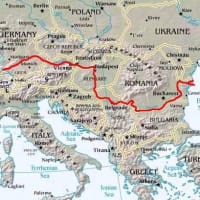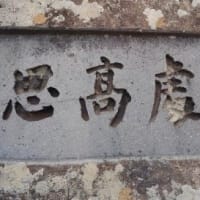マルチン・ルター 1517年
*贖宥状(免罪符)の効力についての討論のための
『95か条の論題(命題)』
ルターは、教皇の贖宥状には、罪を許す効力はなく、信仰にとって有害だと指摘しするために、ヴィッテンベルク城の教会の門前に掲げ、贖宥状(免罪符)の効力を九十五カ条で批判しました。もとは神学宗教)論争のための掲示が、ドイツのみならずヨーロッパ全土に拡がる宗教改革となり、それは戦争状態にまで至った。
具体例としては、ドイツ農民戦争 ( 1524 年 )カール5世即位後のドイツにおこった農民を中心とする大反乱。一揆の矛先は、小領邦を形成しつつある領主と領邦国家に向けられており,事情は農民戦争においても同じであった。しかし農民戦争がそれまでの一揆と異なるのは,宗教改革運動から大きな刺激を受け,「神の法」「神の正義」で彼らの要求の正当性を弁証し得た点であり,そのことを通して一揆はドイツの3分の2をおおう反乱に拡大し得たのである。
ちなみに、ルターは始めは農民に同情的であったが、これが宗教性を帯び、急進性を増すと、直ちにルターはこれを批判、諸侯に過酷な鎮圧を勧告した。
*贖宥状(しょくゆうじょう、ラテン語: indulgentia)とは、16世紀、カトリック教会が発行した罪の償いを軽減する証明書。 贖宥符(しょくゆうふ)、免罪符(めんざいふ)、免償符(めんしょうふ)とも呼ばれる。それらは、日本においては「罪のゆるしを与える」意味で、『責めや罪を免れる』ものや理由、行為そのものを指すこともある。
命題1
わたしたちの主であるイエス・キリストが、「悔い改めよ」と言われた時、彼は信ずる者の全生涯が悔い改めであることを欲したもうたのである。
命題2
この言葉が秘跡としての悔悛(すなわち。司祭の職によって執行される告解と償罪)についてのものであると解することはできない。
命題3
しかし、それは単に内的な悔い改めだけをさしてはいない。否むしろ、外側で働いて肉を種々に殺すことをしないものであるなら、内的な悔い改めはおよそ無に等しい。
命題4
そのため、自己憎悪(すなわち、内における真の悔い改め)のつづく間は、すなわち、天国にはいるまでは、罰はつづくものである。
命題5
教皇は、自分自身または教会法が定めるところによって科した罰を除いては、どのような罰をも赦免することを欲しないし、またできもしない。
命題6
教皇は、神から罪責が赦免されたと宣言し、また確認するか、あるいは、もちろん自分に保留されている事項について ─これらの事項を軽侮したら、罪責はまったく残ることになろう─ 赦免する以外には、どのような罪責をも赦免することはできない。
命題7
神は、人が同時にすべてのことにおいて、神の代理者である司祭に謙虚に従ってしなければ、だれの罪責をも決して赦免したまわない。
命題8
悔悛についての教会法は、生きている人にだけ課せられていて、それによるならば死に臨んでいる人には何も課せられていない。
命題9
そのため聖霊は、教皇がその教会において常に死と必然の項を除外しているので、教皇によってわたしたちによいことをしたもうているのである。
命題10
死に臨む人に、教会法による悔悛を煉獄にまで留保するような司祭たちは、無知で悪い行いをしているのである。
命題11
教会法による罰を転じて煉獄の罰とまでしているあの毒麦は、疑いもなく、司教たちの眠っている間にまかれたと思われる。
命題12
かつては、教会法による罰は、真の痛悔を試みるものとして、赦免の後ではなく前に課せられていた。
命題13
死に臨む人たちは、死によってすべてを支払うのであり、教会法規に対してはすでに死んだ者たちであり、それらの法からは当然解放されている。
命題14
死に臨んでいる人たちの不完全な信仰や愛は、必ず大きな恐れを伴う。そして愛が小さければ小さいほど、恐れは大きいということになるだろう。
命題15
この恐れとおののきは(他のことはいわずとも)、それだけでも十分に煉獄の罰をなしている。なぜなら、それは絶望のおののきにもっとも近いからである。
命題16
地獄、煉獄、天国の異なっているのは、絶望、絶望に近いこと、救いのたしかさの異なっているのと同じように思われる。
命題17
煉獄にある魂にとって、おののきが減ぜられるに応じて愛が増し加えられるのは、必然のように思われる。
命題18
また、煉獄にある魂が、功績や増し加わる愛の状態の外におかれているということは、理性によっても、聖書によっても証明されているとは思えない。
命題19
また、わたしたちはいかに強く救いを確信しているとしても、煉獄にある魂、少なくともその全部のものが自分の救いについて確信し、安心しているということが証明されているとも思われない。
命題20
したがって、教皇は、すべての罰の完全赦免ということによって、これをただもうすべての罰の赦免と解するのではなく、ただ彼自身によって課せられた罰の赦免とだけ解するのである。
命題21
したがって、教皇の贖宥によって、人間はすべての罰から赦免され、救われると述べるあの贖宥説教者たちは誤っている。
命題22
否むしろ、教皇は、煉獄にある魂が、この生において教会法にのっとって課しておかねばならなかったような罰を、煉獄にある魂にたいして赦免することはない。
命題23
とにかく、もしすべての罰の赦免がだれかに与えられうるとするならば、それはもっとも完全な人にだけ、すなわち、ごく僅少な人にだけ与えられることは確かである。
命題24
このことから必然的に、大部分の人は罰の免除についてのあのけじめなく、壮麗な約束によって欺かれていることになる。
命題25
教皇が一般的に煉獄にもっている権限と同じ権限を、どの司教も主任司祭も、その司教区、聖堂区に特殊的にもっている。
命題26
鍵の権限によってではなく(彼はそうしたものをもっていない)、代祷の方法によって魂に赦免を与えることが、教皇として至当なことをしているのである。
命題27
箱の中へ投げ入れられた金がチャリンと鳴るや否や、魂が煉獄から飛び上がると言う人たちは、人間を宣べ伝えているのである。
命題28
金が箱の中でチャリンと鳴ると、確かに利得と貪欲は増すことになる。しかし、教会のなすところはただ神の御心にのみかかっている。
命題29
聖セヴェリウスやパスカリスにあったと語られているように、煉獄で魂のすべてがあがなわれることを願っているかどうかをだれが知っていよう。
命題30
自分の痛悔が真実であることについては、だれも確かではない。まして完全赦免を得たかどうかについてはなおさらのことである。
命題31
真実に悔い改める者がまれであるように、真実に贖宥を買う者もまれである。しかり、もっともまれである。
命題32
贖宥の文書で自分たちの救いが確かであるとみずから信ずる人たちは、その教師たちとともに永遠の罪に定められるであろう。
命題33
教皇のするあのような贖宥は、人間を神と和解させる神、あのはかり知れない賜物なのだという人たちは、大いに警戒されねばならない。
命題34
なぜなら、あの贖宥の恵みは、人間によって制定された秘跡による償罪の罰にだけかかわるからである。
命題35
魂を《煉獄から》買い出し、あるいは、告解証を買おうとしている者に、痛悔が不必要であると教える人たちは、非キリスト教的なことを説いている。
命題36
真実に痛悔したキリスト者ならだれでも、贖宥の文書がなくても彼のものとされているところの、罰と罪責より完全赦免をもっている。
命題37
真実のキリスト者ならだれでも、生きている者も死んでいる者も、贖宥の文書がなくても神から彼に与えられたものである、キリストと教会とのすべての宝にあずかっているのである。
命題38
しかし、教皇からくる赦免と伝達とは、決して侮蔑してはならない。なぜなら、(すでに述べたように)それは神の赦免の宣言であるからである。
命題39
もっとも博学な神学者たちにとっても、人々の前で贖宥の寛大さと痛悔の真実さとを同時にほめることは、もっとも困難である。
命題40
真実の痛悔は罰を求め、またこれを愛する。しかし、贖宥の寛大さは《罰を》ゆるめ、これを憎むようにしむける ─少なくとも、そのような機会となる。
命題41
使徒的贖宥は、人々がこれを他の愛のよいわざより優位におかれるものだと誤解しないように、注意して説かれねばならない。
命題42
贖宥を買うことが、どのような点でも、あわれみのわざに比すことだということは、教皇の考えではないということを、キリスト者は教えられねばならない。
命題43
貧しいものに与えたり、困窮しているものに貸与している人は、贖宥を買ったりするよりも、よりよいことをしているのだと、キリスト者は教えられねばならない。
命題44
なぜなら、愛のわざによって愛は成長し、人間はよりよくなるからであるが、贖宥によっては人間はよりよくならず、ただ罰から自由となるにすぎないからである。
命題45
困窮しているものを見て、彼を無視して贖宥に金銭を払う人は、教皇の贖宥ではなく、神の怒りを自分に招いているのだと、キリスト者は教えられねばならない。
命題46
人があり余るほどに豊かでないかぎり、必要なものは自分の家にとどめておかねばならず、決して贖宥のために浪費してはならないのだと、キリスト者は教えられねばならない。
命題47
贖宥を買うのは自由であって、命ぜられたことではないのだと、キリスト者は教えられねばならない。
命題48
贖宥を与える場合、教皇は用意されている金銭以上に、自分のために熱心な祈りを、より求め、より望んでいるということを、キリスト者は教えられねばならない。
命題49
教皇の贖宥は、もし人々がこれに信頼しないのであれば有益であるが、これによって神への恐れを捨てるのであればもっとも有害であることを、キリスト者は教えられねばならない。
命題50
もし教皇が贖宥説教家たちのする取り立てを知っていたなら、彼は聖ペテロ聖堂が自分の羊たちの皮、肉、骨で建てられるより、むしろ灰と消えることを選ぶということを、キリスト者は教えられねばならない。
命題51
教皇は(もし必要ならば)聖ペテロ聖堂を売ってまでも、あの人々に、 ─その大多数のものから、贖宥の扇動家たちが金銭をまき上げているのであるが─ 自分の金のうちから与えるべきであるし、またそのように欲しているということを、キリスト者は教えられねばならない。
命題52
たとい委任されたものが、否教皇自身が自分の魂をかけてそれを保証しても、贖宥の文書による救いを信頼するのはむなしいことである。
命題53
贖宥を説教するために、他の諸教会では神の御言がまったく沈黙するように命ずる人たちは、キリストの敵、教皇の敵である。
命題54
同一説教の中で、贖宥にたいして神の御言と同等、あるいは、それ以上の時間が費されるとすれば、それは神の御言にたいして不正となるのである。
命題55
贖宥が(それは最小のものである)一つの鐘、一つの行列、一つの儀式で行われるのであれば、福音は(それは最大のものである)百の鐘、百の行列、百の儀式をもって説教されねばならないというのが、必ずや教皇の考えるところである。
命題56
教会の宝から教皇は贖宥を与えているのであるが、それはキリストの民には十分に述べられてもいないし、また知られてもいない。
命題57
説教者の多くがこの宝をそうたやすく放出しないで、ただ集めることだけをしているという理由からは、確かに宝がこの世のものでないことは明らかである。
命題58
また、それらの宝はキリストと聖徒たちの功績でもない。なぜなら、これらの功績は常に、教皇なくしても内なる人には恵みを、また、外なる人には十字架、死、陰府を与える働きをするからである。
命題59
聖ラウレンティスは、教会の宝は教会の貧者たちであると語っているが、彼はその時代の語法にしたがって言ったのである。
命題60
わたしたちは、(キリストの功績によって与えられた)教会の鍵が教会の宝であるというが、無思慮に言っているのではない。
命題61
なぜなら、罰と《教皇の》留保事項との赦免については、ただ教皇の権能だけで十分であることが明らかである。
命題62
教会の真の宝は、神の栄光と恵みとのもっとも聖なる福音である。
命題63
しかし、この宝は、第一の者を最後の者とするので[マタイ20:16]、当然もっとも憎まれるものである。
命題64
他方、贖宥の宝は、最後の者を第一の者とするので、当然もっとも喜ばれるものである。
命題65
したがって、福音の宝は網である ─かつてはこれで富める人々をすなどったのである。
命題66
贖宥の宝は網である ─今ではこれで人々の富をすなどっているのである。
命題67
説教者たちが大声で最大の恵みだと呼びかけている贖宥は、利得を増大させるかぎりにおいて、真に最大の恵みだと解される。
命題68
しかし、それら《贖宥》は神の恵みと十字架の敬虔とに比較すると、実際もっとも小さいものである。
命題69
司教や主任司祭たちは、使徒的贖宥を委任されている者たちを敬意をつくして認める義務がある。
命題70
しかし、彼らは目をみひらき、耳をそばだてて、これら委任されている者たちが教皇の委任の代わりに、自分たちの夢を説教することがないように注意する義務がもっともっとある。
命題71
使徒的贖宥の真理に反して語るものには、アナテマと呪いあれ。
命題72
しかし、贖宥の説教者の言葉の欲と放恣とに対して真に心するものには、祝福あれ。
命題73
どのような方法であれ、策謀して贖宥の売買に害を加えようとする者たちを、教皇が雷で打つのが正当であるのと同様に。
命題74
それより更に教皇は、策謀して贖宥を口実として聖なる愛と真理とに害を加えようとする者たちを、雷で打とうと意図するのである。
命題75
たといだれかが、不可能なことではあるが、神の母を犯したとしても、教皇の贖宥がその人間を解放しうるほどに大きいと考えるのは狂っているのである。
命題76
これに反してわたしたちは、教皇の贖宥は、小罪のうちのもっとも小さいものでも、罪責に関するかぎりでは、これを除去することができないと言うのである。
命題77
もし聖ペテロが今教皇であったとしても、彼はそれより大きい恵みを与えることができないと言うことは、聖ペテロと教皇にたいする冒涜である。
命題78
これに反してわたしたちは、現教皇もまたどの教皇も、贖宥より大きいもの、すなわち第1コリント12章[28節]にあるように、福音、諸力、いやしの恵みなどをもっていると言うのである。
命題79
教皇の紋章をつけて目立つように立てられた十字架が、キリストの十字架と同じであると言うのは、冒涜である。
命題80
このような説教が人々に行きわたることを許している司教、主任司祭、神学者たちは、釈明しなければならないだろう。
命題81
贖宥についてのこのような気ままな説教は、信徒のとがめだてや、あるいはいうまでもなく鋭い質問から教皇への敬意を救ってやることが、博学の人たちにさえ容易でないようにしている。
命題82
すなわち、「もし教皇が、大聖堂建設のためのもっとも汚れた金、すなわち、もっともいやしい理由によって無数の魂を贖うとすれば、なぜ教皇はもっと聖なる愛や魂が最大に必要とするもの、すなわち、すべてのうちでもっとも正しい理由によって煉獄をからにしないのであろうか」。
命題83
また、「贖われた者のために祈ることはすでに不正であるのに、なぜ死者のための葬式や記念がいつまでも続くのであろうか、また、なぜ教皇は死者のために献げられた献財を返さなかったり、回収することを許さなかったりするのであろうか」。
命題84
また、「不敬虔な者、敵対する者には、金を出せば敬虔で神の愛する魂を買うことを認めながら、敬虔で愛される魂自身の必要のためであるなら、これを無償の愛によって贖うことをしないような神と教皇との新しい敬虔とは何であろうか」。
命題85
また、「事実そのもの、また使用しなかったことからも、すでに長い間、それ自体廃棄され、死物となっていた悔悛の教会法規が、今になっても、贖宥の認可のため、金でもって ─あたかも今がもっとも強力であるかのように─ うけ出されているのはなぜであるか」。
命題86
また、「もっとも富めるクラススよりも、今日では豊かな財をもつ教皇が、なぜ貧しい信者の金よりむしろ自分の金で、この聖ペテロ大聖堂をひとつ建てないのか」。
命題87
また、「まったき痛悔によって完全赦免と《恵みに》あずかる権利を十分にもつ者に対して、教皇は何を赦免し、何をわかち与えるのであろうか」。
命題88
また、「教皇はいま一回だけしているが、もし一日百回どの信者にもこれらの赦免と伝達を与えるなら、それよりも大きな善いことが教会に加えられるであろうか」。
命題89
「教皇が贖宥によっては、金よりもむしろ魂の救いを求めていることからすれば、彼は、すでに以前に与えられた文書と贖宥とを、それらが現在同じように有効であるのに、なぜ停止させるのか」。
命題90
以上のような信徒のもっとも細心の議論を、力だけでおさえたり、理由をあげて解かなかったりすることは、教会と教皇とを敵の嘲笑にさらし、キリスト者を不幸にすることである。
命題91
したがって、もし贖宥が教皇の精神と意図に従って説教されるとすれば、これらすべてのことは容易に解消するであろう、否存在することもないだろう。
命題92
だからキリストの民に「平安、平安」[エレミヤ6:1、エゼキエル13:10、16]という、かのすべての預言者たちは立ち去るがよい ─そこには平和はない。
命題93
キリストの民に「十字架、十字架」という、かのすべての預言者たちは、さいわいである ─そこには十字架はない。
命題94
キリスト者はその首であるキリストに、罰、死、地獄を通して、従うことに励むように、勧められねばならない。
命題95
そしてキリスト者は、平安の保証によるよりも、むしろ多くの苦しみによって、天国にはいることを信じなければならない[使徒14:22]。
6th February 2013、
投稿者 山田浩己 さんルーテル教会 資料より
http://ruteru.blogspot.jp/2013/02/95.html?m=1
参考図書
小田部 進一 著
ルターから今を考える: 宗教改革500年の記憶と想起
説明
内容紹介
「95か条の論題」から2017年で500年。いわゆる宗教改革から500年を迎えようとしている今、宗教改革者ルターの行ったことをどのように想起するのか。その生涯と思想を追いながら、今につながる課題を見据える。キリスト教徒の減少、それにともなう価値観の揺らぎを経験するドイツの現在から、日本社会とそこに生きる姿勢が問われる。
著者(小田部 進一)について
1968年生まれ。関西学院大学神学部博士課程前期課程修了(修士)。ミュンヘン大学にてDr. theol.取得。2016年現在、玉川大学文学部教授。
以下は、
From
"Project Wittenberg"
isputatio pro declaratione virtutis indulgentiarum. 1517
Disputation of Doctor Martin Luther
on the Power and Efficacy of Indulgences
by Dr. Martin Luther, 1517
Martin Luther - Project Wittenberg
Disputation of Doctor Martin Luther
on the Power and Efficacy of Indulgences
by Dr. Martin Luther (1517)
Out of love for the truth and the desire to bring it to light, the following propositions will be discussed at Wittenberg, under the presidency of the Reverend Father Martin Luther, Master of Arts and of Sacred Theology, and Lecturer in Ordinary on the same at that place. Wherefore he requests that those who are unable to be present and debate orally with us, may do so by letter.
In the Name our Lord Jesus Christ. Amen.
1. Our Lord and Master Jesus Christ, when He said Poenitentiam agite, willed that the whole life of believers should be repentance.
2. This word cannot be understood to mean sacramental penance, i.e., confession and satisfaction, which is administered by the priests.
3. Yet it means not inward repentance only; nay, there is no inward repentance which does not outwardly work divers mortifications of the flesh.
4. The penalty [of sin], therefore, continues so long as hatred of self continues; for this is the true inward repentance, and continues until our entrance into the kingdom of heaven.
5. The pope does not intend to remit, and cannot remit any penalties other than those which he has imposed either by his own authority or by that of the Canons.
6. The pope cannot remit any guilt, except by declaring that it has been remitted by God and by assenting to God's remission; though, to be sure, he may grant remission in cases reserved to his judgment. If his right to grant remission in such cases were despised, the guilt would remain entirely unforgiven.
7. God remits guilt to no one whom He does not, at the same time, humble in all things and bring into subjection to His vicar, the priest.
8. The penitential canons are imposed only on the living, and, according to them, nothing should be imposed on the dying.
9. Therefore the Holy Spirit in the pope is kind to us, because in his decrees he always makes exception of the article of death and of necessity.
10. Ignorant and wicked are the doings of those priests who, in the case of the dying, reserve canonical penances for purgatory.
11. This changing of the canonical penalty to the penalty of purgatory is quite evidently one of the tares that were sown while the bishops slept.
12. In former times the canonical penalties were imposed not after, but before absolution, as tests of true contrition.
13. The dying are freed by death from all penalties; they are already dead to canonical rules, and have a right to be released from them.
14. The imperfect health [of soul], that is to say, the imperfect love, of the dying brings with it, of necessity, great fear; and the smaller the love, the greater is the fear.
15. This fear and horror is sufficient of itself alone (to say nothing of other things) to constitute the penalty of purgatory, since it is very near to the horror of despair.
16. Hell, purgatory, and heaven seem to differ as do despair, almost-despair, and the assurance of safety.
17. With souls in purgatory it seems necessary that horror should grow less and love increase.
18. It seems unproved, either by reason or Scripture, that they are outside the state of merit, that is to say, of increasing love.
19. Again, it seems unproved that they, or at least that all of them, are certain or assured of their own blessedness, though we may be quite certain of it.
20. Therefore by "full remission of all penalties" the pope means not actually "of all," but only of those imposed by himself.
21. Therefore those preachers of indulgences are in error, who say that by the pope's indulgences a man is freed from every penalty, and saved;
22. Whereas he remits to souls in purgatory no penalty which, according to the canons, they would have had to pay in this life.
23. If it is at all possible to grant to any one the remission of all penalties whatsoever, it is certain that this remission can be granted only to the most perfect, that is, to the very fewest.
24. It must needs be, therefore, that the greater part of the people are deceived by that indiscriminate and highsounding promise of release from penalty.
25. The power which the pope has, in a general way, over purgatory, is just like the power which any bishop or curate has, in a special way, within his own diocese or parish.
26. The pope does well when he grants remission to souls [in purgatory], not by the power of the keys (which he does not possess), but by way of intercession.
27. They preach man who say that so soon as the penny jingles into the money-box, the soul flies out [of purgatory].
28. It is certain that when the penny jingles into the money-box, gain and avarice can be increased, but the result of the intercession of the Church is in the power of God alone.
29. Who knows whether all the souls in purgatory wish to be bought out of it, as in the legend of Sts. Severinus and Paschal.
30. No one is sure that his own contrition is sincere; much less that he has attained full remission.
31. Rare as is the man that is truly penitent, so rare is also the man who truly buys indulgences, i.e., such men are most rare.
32. They will be condemned eternally, together with their teachers, who believe themselves sure of their salvation because they have letters of pardon.
33. Men must be on their guard against those who say that the pope's pardons are that inestimable gift of God by which man is reconciled to Him;
34. For these "graces of pardon" concern only the penalties of sacramental satisfaction, and these are appointed by man.
35. They preach no Christian doctrine who teach that contrition is not necessary in those who intend to buy souls out of purgatory or to buy confessionalia.
36. Every truly repentant Christian has a right to full remission of penalty and guilt, even without letters of pardon.
37. Every true Christian, whether living or dead, has part in all the blessings of Christ and the Church; and this is granted him by God, even without letters of pardon.
38. Nevertheless, the remission and participation [in the blessings of the Church] which are granted by the pope are in no way to be despised, for they are, as I have said, the declaration of divine remission.
39. It is most difficult, even for the very keenest theologians, at one and the same time to commend to the people the abundance of pardons and [the need of] true contrition.
40. True contrition seeks and loves penalties, but liberal pardons only relax penalties and cause them to be hated, or at least, furnish an occasion [for hating them].
41. Apostolic pardons are to be preached with caution, lest the people may falsely think them preferable to other good works of love.
42. Christians are to be taught that the pope does not intend the buying of pardons to be compared in any way to works of mercy.
43. Christians are to be taught that he who gives to the poor or lends to the needy does a better work than buying pardons;
44. Because love grows by works of love, and man becomes better; but by pardons man does not grow better, only more free from penalty.
45. Christians are to be taught that he who sees a man in need, and passes him by, and gives [his money] for pardons, purchases not the indulgences of the pope, but the indignation of God.
46. Christians are to be taught that unless they have more than they need, they are bound to keep back what is necessary for their own families, and by no means to squander it on pardons.
47. Christians are to be taught that the buying of pardons is a matter of free will, and not of commandment.
48. Christians are to be taught that the pope, in granting pardons, needs, and therefore desires, their devout prayer for him more than the money they bring.
49. Christians are to be taught that the pope's pardons are useful, if they do not put their trust in them; but altogether harmful, if through them they lose their fear of God.
50. Christians are to be taught that if the pope knew the exactions of the pardon-preachers, he would rather that St. Peter's church should go to ashes, than that it should be built up with the skin, flesh and bones of his sheep.
51. Christians are to be taught that it would be the pope's wish, as it is his duty, to give of his own money to very many of those from whom certain hawkers of pardons cajole money, even though the church of St. Peter might have to be sold.
52. The assurance of salvation by letters of pardon is vain, even though the commissary, nay, even though the pope himself, were to stake his soul upon it.
53. They are enemies of Christ and of the pope, who bid the Word of God be altogether silent in some Churches, in order that pardons may be preached in others.
54. Injury is done the Word of God when, in the same sermon, an equal or a longer time is spent on pardons than on this Word.
55. It must be the intention of the pope that if pardons, which are a very small thing, are celebrated with one bell, with single processions and ceremonies, then the Gospel, which is the very greatest thing, should be preached with a hundred bells, a hundred processions, a hundred ceremonies.
56. The "treasures of the Church," out of which the pope. grants indulgences, are not sufficiently named or known among the people of Christ.
57. That they are not temporal treasures is certainly evident, for many of the vendors do not pour out such treasures so easily, but only gather them.
58. Nor are they the merits of Christ and the Saints, for even without the pope, these always work grace for the inner man, and the cross, death, and hell for the outward man.
59. St. Lawrence said that the treasures of the Church were the Church's poor, but he spoke according to the usage of the word in his own time.
60. Without rashness we say that the keys of the Church, given by Christ's merit, are that treasure;
61. For it is clear that for the remission of penalties and of reserved cases, the power of the pope is of itself sufficient.
62. The true treasure of the Church is the Most Holy Gospel of the glory and the grace of God.
63. But this treasure is naturally most odious, for it makes the first to be last.
64. On the other hand, the treasure of indulgences is naturally most acceptable, for it makes the last to be first.
65. Therefore the treasures of the Gospel are nets with which they formerly were wont to fish for men of riches.
66. The treasures of the indulgences are nets with which they now fish for the riches of men.
67. The indulgences which the preachers cry as the "greatest graces" are known to be truly such, in so far as they promote gain.
68. Yet they are in truth the very smallest graces compared with the grace of God and the piety of the Cross.
69. Bishops and curates are bound to admit the commissaries of apostolic pardons, with all reverence.
70. But still more are they bound to strain all their eyes and attend with all their ears, lest these men preach their own dreams instead of the commission of the pope.
71. He who speaks against the truth of apostolic pardons, let him be anathema and accursed!
72. But he who guards against the lust and license of the pardon-preachers, let him be blessed!
73. The pope justly thunders against those who, by any art, contrive the injury of the traffic in pardons.
74. But much more does he intend to thunder against those who use the pretext of pardons to contrive the injury of holy love and truth.
75. To think the papal pardons so great that they could absolve a man even if he had committed an impossible sin and violated the Mother of God -- this is madness.
76. We say, on the contrary, that the papal pardons are not able to remove the very least of venial sins, so far as its guilt is concerned.
77. It is said that even St. Peter, if he were now Pope, could not bestow greater graces; this is blasphemy against St. Peter and against the pope.
78. We say, on the contrary, that even the present pope, and any pope at all, has greater graces at his disposal; to wit, the Gospel, powers, gifts of healing, etc., as it is written in I. Corinthians xii.
79. To say that the cross, emblazoned with the papal arms, which is set up [by the preachers of indulgences], is of equal worth with the Cross of Christ, is blasphemy.
80. The bishops, curates and theologians who allow such talk to be spread among the people, will have an account to render.
81. This unbridled preaching of pardons makes it no easy matter, even for learned men, to rescue the reverence due to the pope from slander, or even from the shrewd questionings of the laity.
82. To wit: -- "Why does not the pope empty purgatory, for the sake of holy love and of the dire need of the souls that are there, if he redeems an infinite number of souls for the sake of miserable money with which to build a Church? The former reasons would be most just; the latter is most trivial."
83. Again: -- "Why are mortuary and anniversary masses for the dead continued, and why does he not return or permit the withdrawal of the endowments founded on their behalf, since it is wrong to pray for the redeemed?"
84. Again: -- "What is this new piety of God and the pope, that for money they allow a man who is impious and their enemy to buy out of purgatory the pious soul of a friend of God, and do not rather, because of that pious and beloved soul's own need, free it for pure love's sake?"
85. Again: -- "Why are the penitential canons long since in actual fact and through disuse abrogated and dead, now satisfied by the granting of indulgences, as though they were still alive and in force?"
86. Again: -- "Why does not the pope, whose wealth is to-day greater than the riches of the richest, build just this one church of St. Peter with his own money, rather than with the money of poor believers?"
87. Again: -- "What is it that the pope remits, and what participation does he grant to those who, by perfect contrition, have a right to full remission and participation?"
88. Again: -- "What greater blessing could come to the Church than if the pope were to do a hundred times a day what he now does once, and bestow on every believer these remissions and participations?"
89. "Since the pope, by his pardons, seeks the salvation of souls rather than money, why does he suspend the indulgences and pardons granted heretofore, since these have equal efficacy?"
90. To repress these arguments and scruples of the laity by force alone, and not to resolve them by giving reasons, is to expose the Church and the pope to the ridicule of their enemies, and to make Christians unhappy.
91. If, therefore, pardons were preached according to the spirit and mind of the pope, all these doubts would be readily resolved; nay, they would not exist.
92. Away, then, with all those prophets who say to the people of Christ, "Peace, peace," and there is no peace!
93. Blessed be all those prophets who say to the people of Christ, "Cross, cross," and there is no cross!
94. Christians are to be exhorted that they be diligent in following Christ, their Head, through penalties, deaths, and hell;
95. And thus be confident of entering into heaven rather through many tribulations, than through the assurance of peace.
pwimage
付記
農民の「12カ条要求」
ドイツ農民戦争の最中、1525年に作成された農民側の綱領である「農民の12ヶ条要求」の中で、農奴制の廃止、封建地代の軽減、裁判の公正などを要求した。12ヶ条の要点は次のようなものである。
(1)未来においてわれわれが力と権威をもち、したがってあらゆる村が牧師を選任し任命しうること、そして牧師が不つごうな行為をしたばあいにはそれを罷免する権利をわれわれが持つべきこと。選ばれた牧師は福音書に教義や命令を付け加えないこと。
(2)教会の十分の一税は、われわれの選んだ牧師の生活費に充て、残りはその地の貧民に与えること。
(3)キリストは自らの血を流して身分の高いもの、低いものの例外なく解放した給うた。われわれが自由であるべきこと、自由であろうと望むことは聖書に合致している。キリスト教徒としてわれわれを農奴の地位から救い出してくれることはとうぜんである。
(4)貧乏人には鹿や野鳥や魚を捕ることが許されないという習慣をなくし、キリスト者として同じ権利を与えること。
(5)森を貴族が占有していることをやめ、村に返還し、村民が管理して必要な薪を得られるようにすること。
(6)日々に増加する過度の賦役にかんして、親切な配慮が払われることを要求する。
(7)領主は農民との協定に照らして正当なものだけを要求し、賦役や貢租を無償で農民から強奪してはならないこと。
(8)不当な地代によってわれわれが零落しないように、領主は適正な人を派遣して(地主の)占有地を点検すること。
(9)新しい法律が絶えず作られわれわれは裁判によらないで裁かれている。旧来の成文法で裁判され、公正な判決であること。
(10)かつて村に属していた牧場や耕地(入会地)を個人が占有しているのを、とりもどせること。
(11)相続税を完全に廃止すること。
(12)以上の箇条が聖書の言葉と一致しないものであれば、その箇条は喜んで撤回する。
<エンゲルス『ドイツ農民戦争』1850
岩波文庫 付録p.205-215>




















※コメント投稿者のブログIDはブログ作成者のみに通知されます